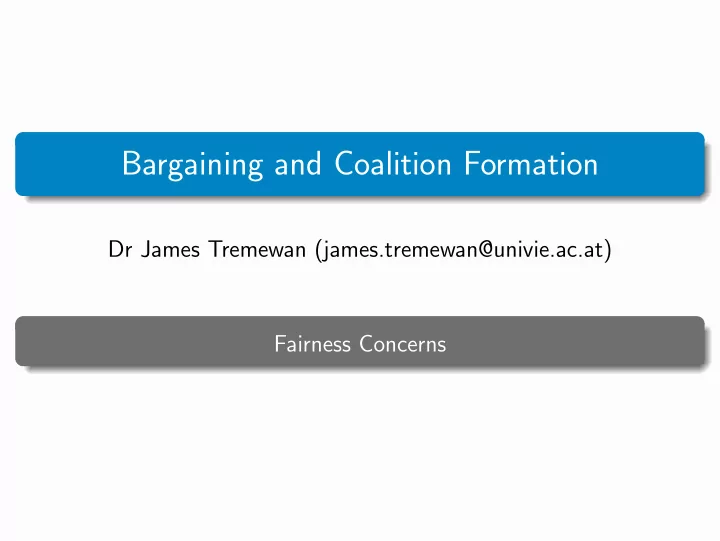

Bargaining and Coalition Formation Dr James Tremewan (james.tremewan@univie.ac.at) Fairness Concerns
Fairness Concerns Fairness concerns in bargaining • ”Stylized facts” from Ultimatum Game experiments: • Virtually no offers above 50%. [1] • Most offers between 40 and 50%. [2] • Low offers are frequently rejected. [3] • Probability of rejection decreases in size of offer. [4] • [2-4] contradict game theoretic predictions based on the assumption of selfish preferences. • Altruism can explain [2] but not [3,4]. • Fehr and Schmidt (1999) propose a simple model of fairness concerns that explain [1-4] (and a number of experimental results for other games). 2/6
Fairness Concerns Fehr and Schmidt (1999) • Fairness modeled as ”self-centered inequity aversion.” • Inequity aversion: people willing to give up some payoff to move to more equitable outcome. • Self-centered: people care only how their payoff compares to others’, not about inequality amongst others. • Note: Can be interpreted as reduced form for caring about others’ intentions if actions that lead to unfair outcomes are viewed as indicating bad intentions. • Note: Third party punishment experiments suggest people do care about unfair outcomes amongst others (e.g. Fehr and Fischbacher (2004). The model can be easily extended to accommodate this and e.g. different reference points such as average payoff. 3/6
Fairness Concerns Fehr and Schmidt (1999) - two-player case • U i ( x ) = x i − α i max | x j − x i , 0 | − β i max | x i − x j , 0 | . • x i ( x j ) = own (other’s) monetary payoff. • α i is sensitivity to unfair outcomes where the other gets more. • β i is sensitivity to unfair outcomes where other gets less. • F&S assume β ≤ α i and 0 ≤ β i < 1 • β ≤ α i implies people suffer more from inequality that is to their disadvantage (evidence for this in Loewenstein, Thompson, and Bazerman (1989). • 0 ≤ β i rules out status seeking. Such people exist, but have no impact on equilibrium behaviour in contexts considered in F&S. • β ≥ 1 implies preference for throwing away money if x i > x j , which is odd. 4/6
Fairness Concerns Fairness concerns in the Ultimatum Game • Proposer/Responder characterised by ( α 1 , β 1 )/( α 2 , β 2 ). • Proposer offers proportion s , Responder accepts or rejects. • Results for responder: • Responder accepts any offer s ≥ 0 . 5 • Responder rejects iff s < s ( a 2 ) ≡ α 2 / (1 + 2 α 2 ) < 0 . 5 • If Proposer knows ( α 2 , β 2 ), offers s ∗ • = 0 . 5 if β 1 > 0 . 5 • ∈ [ s ( α 2 ) , 0 . 5] if β 1 = 0 . 5 • = s ( α 2 ) if β 1 > 0 . 5 • Stylised Fact [1-3] explained. • Similar results if Proposer knows only that α 2 ∼ F ( α 2 ). Heterogeneity in (beliefs about) α 2 gives variation in offers and Stylised Fact [4]. 5/6
Fairness Concerns More general model of social preferences: Charness and Rabin (2002) • U B ( π A , π B ) = ( ρ · r + σ · s + θ · q ) · π A +(1 − ρ · r − σ · s − θ · q ) · π B • r = 1 if π B > π A , and 0 otherwise; • s = 1 if π B < π A , and 0 otherwise; • q = 1 if A has ”misbehaved”, and 0 otherwise. • θ measures reciprocity. • σ and ρ allow for distributional preferences unrelated to reciprocity: • σ ≤ ρ implies competitive preferences. • σ < 0 < ρ < 1 like Fehr and Schmidt. • 0 < σ ≤ ρ ≤ 1 incorporates ”social-welfare” concerns. • Many experiments seek to estimate population and individual level parameters of this model. 6/6
Recommend
More recommend